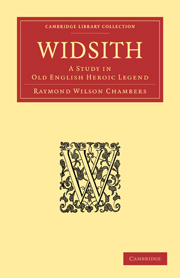Book contents
- Frontmatter
- PREFACE
- Contents
- CORRECTIONS AND ADDITIONAL NOTES
- CHAP. I WIDSITH AND THE GERMAN HEROIC AGE
- CHAP. II THE STORIES KNOWN TO WIDSITH: GOTHIC AND BURGUNDIAN HEROES
- CHAP. III THE STORIES KNOWN TO WIDSITH: TALES OF THE SEA-FOLK, OF THE FRANKS AND OF THE LOMBARDS
- CHAP. IV WIDSITH AND THE CRITICS
- CHAP. V THE GEOGRAPHY OF WIDSITH
- CHAP. VI THE LANGUAGE AND METRE OF WIDSITH
- CHAP. VII SUMMARY AND CONCLUSION
- TEXT OF WIDSITH, WITH NOTES
- APPENDIX
- MAPS AND INDEX
CHAP. VI - THE LANGUAGE AND METRE OF WIDSITH
Published online by Cambridge University Press: 16 May 2011
- Frontmatter
- PREFACE
- Contents
- CORRECTIONS AND ADDITIONAL NOTES
- CHAP. I WIDSITH AND THE GERMAN HEROIC AGE
- CHAP. II THE STORIES KNOWN TO WIDSITH: GOTHIC AND BURGUNDIAN HEROES
- CHAP. III THE STORIES KNOWN TO WIDSITH: TALES OF THE SEA-FOLK, OF THE FRANKS AND OF THE LOMBARDS
- CHAP. IV WIDSITH AND THE CRITICS
- CHAP. V THE GEOGRAPHY OF WIDSITH
- CHAP. VI THE LANGUAGE AND METRE OF WIDSITH
- CHAP. VII SUMMARY AND CONCLUSION
- TEXT OF WIDSITH, WITH NOTES
- APPENDIX
- MAPS AND INDEX
Summary
Dialect
Widsith, like almost all Old English poetry, is written in the normal Late West Saxon literary speech. But certain words, chiefly proper names, show that the poem has been transliterated from a non-W.S. dialect. Such are Breoca, Eatul, Earmanric, Heaðo-, Seafola, Wald, freoðu-, geofum, meodu-scœceð, sprēcan. Some of these forms, like Wald, though commoner in Anglian, are not unknown in W.S.: but most are quite impossible in a pure W.S. dialect. Equally significant is the odd form Creacum, where we should expect Crecum. For, if the scribe had been transliterating from an Anglian original, he would have often had to change Angl. ē to W.S. ēa: and he might easily have done this once too often, and have wrongly written Creacum for Crecum, just as he would rightly have written eac for ec.
The dialect points, then, to a non-W.S., and probably Anglian, origin for our poem: and this confirms what we should expect from the place allotted to Offa, the greatest of all Anglian heroes.
The language has been too much altered for it to give much indication of date, except where a change involves a difference in the number of syllables: in which cases the metre sometimes preserves the earlier form, or more often betrays what the earlier form must have been.
Syntactical Usages
Attempts to determine the date of O.E. poems by observing the usage of the demonstrative, se, seo, þœt, and of the weak adjective, were made by Lichtenheld in 1872.
- Type
- Chapter
- Information
- WidsithA Study in Old English Heroic Legend, pp. 166 - 176Publisher: Cambridge University PressPrint publication year: 2010First published in: 1912

